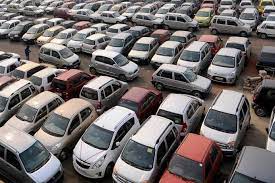On the basis of a decision of the European Parliament from 2035 on the territory of the EU will stop the sale of cars with internal combustion engines. Their place will be taken by electric cars and other environmentally friendly vehicles. However, driving petrol and diesel cars will not be banned.
According to analysts, this could cause “the Havana effect, where instead of new and expensive cars, people will start buying second-hand cars en masse.
Freedom Island
Anyone who has been to Cuba or is interested in traveling knows that in this country the roads are mostly retro cars, which are sometimes 70 years old. Especially many of these cars are in the resorts and the capital of Havana.
The American classics of the 50s and 60s of the last century look authentic and give the island of Freedom a kind of charm. People seem to be in the past thanks to a time machine. Cubans, however, ride retro cars not from a very good life. The embargo on car imports imposed on the country is to blame. The Cubans never learned to make their own cars.
Something similar could happen in Europe. Car owners are used to their petrol vehicles. They have their advantages and are cheaper than electric cars. If the latter do not become cheaper and the mileage is not increased with one charge, it is likely that many EU citizens will use the available equipment to the last. It is possible that from 2035 there will be a boom in second-hand cars in the EU.
Before the locomotive
By the way, European countries do not intend to wait for a unified solution and have started approving national programs for the transition to environmentally friendly modes of transport.
Surprisingly, the residents of the northern countries, where the operation of electric vehicles is complicated by heavy rainfall, snowfall and severe cold, are most in favor of reducing harmful emissions.
For example, cars with petrol or diesel engines will not be sold in Norway from 2025. Currently, the share of electric cars has exceeded 65%. Britain, Sweden, Denmark, the Netherlands and Belgium are planning a “green transition” in 2030.
France intends to take this step no later than 2040. But if uniform EU rules are adopted, the process will have to be speeded up.
Manufacturers do not mind
It can be assumed that car manufacturers will resist the innovations until the end, will sabotage the decisions and will lobby for the extension of the term for sales of cars with internal combustion engines.
But to everyone’s surprise, the companies are ready for the changes, despite the huge funds they will have to invest in the construction and re-equipment of the production.
After all, everyone will work under the same conditions. Manufacturers have long understood where the wind blows. For example, General Motors, Volvo, Jaguar and Ford already have strategies for abandoning classic engines as well as switching to electric ones.
Volkswagen and Mercedes announced something similar. Chinese and Japanese manufacturers also have the necessary technology. However, it is sad that serious competencies in the production of fossil fuel engines will be lost.
The technology of production of gasoline engines has developed a lot in its time and has even become almost an art.
However, not everyone is ready for change.
Meanwhile, not all EU member states support a complete abandonment of internal combustion engines. In the first place, this affects poor countries. The Czech Republic, where Skoda is produced, is strongly opposed.
Currently, the models of the brand are in great demand, but the company does not have large resources for the re-equipment of production. In Germany – the automotive capital of the world – also rages serious passions.
Expensive models with powerful engines are the locomotive and the pride of the industry. Will Mercedes, Porsche, BMW keep their character in the transition to electric motors?
Politician Hans Gizeke says the EU should expect a “Havana effect”. However, the Green Party, which came to power, believes that changes are needed. “The sooner we succeed in the transition to Europe and get rid of dependence on expensive fossil fuels, the better we will feel in the face of global competition,” said Katharina Drege, head of the Greens in the German Bundestag.







